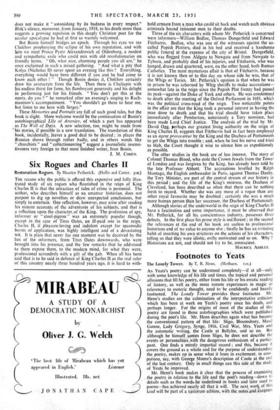Six Rogues and Charles II Restoration Rogues. By Maurice Petherick.
(Hollis and Carter. 30.) THE reason why the public is offered this expensive and fully illus- trated study of six rogues who flourished in the reign of King Charles II is that the attraction of tales of crime is perennial. The author, who describes himself as an amateur historian, does not purport to dig up novelties or draw unexpected conclusions, but simply to entertain. One reflection', however, may arise after reading his minute accounts of the adventures of his subjects, and that is a reflection upon the character,of the King. The profession of spy, informer or " stool-pigeon " was an extremely popular though, except in the case of Titus Oates, an ill-paid one in the reign. Charles II, if pleasure-loving and indolent except for spasmodic bursts of application, was highly intelligent and of a devastating wit. It is plain that never for one moment was he deceived by the lies of the informers, from Titus Oates downwards, who were brought into his presence, and the few remarks that he addressed to them expose them, to the modern mind, for what they were, professional scoundrels with a gift of the gab. When all has been said that is to be said in defence of King Charles II as the real ruler of this country nearly three hundred years ago, it is hard to with-
hold censure from a man who could sit back and watch such obvious criminals hound innocent men to their deaths.
Three of the six characters with whom Mr. Petherick is concerned were informers—William Bedloe, Thomas Dangerfield and Edward Fitzharris. Bedloe, who was one of the witnesses against the so- called Popish Plotters, died in his bed and received a handsome public funeral at the expense of the city of Bristol. Dangerfield, who was flogged from Aldgate to Newgate and from Newgate to Tyburn, and probably died of his Injuries, and Fitzharris, who was hanged, drawn and quartered, were, on the other hand, both Roman Catholics. The most mysterious affair is that of Fitzharris, because it is not known then or to this day on whose side he was, that of the Whigs or Tories. Mr. Petherick's opinion is that when he was in prison he was suborned by Whig sheriffs to make accusations— somewhat late in the reign since the Popish Plot frenzy had passed its peak—against the Duke of York and others. He was condemned to death after the meeting of the Oxford Parliament in 1681, which was the political cross-road of the reign. Two noticeable points in the affair are that the King took a personal interest in having the man done to death and that his trial should have taken place immediately after Pemberton, notoriously a Tory nominee, had been made Lord Chief Justice. The analysis of the trial by Mr. David Ogg, perhaps our greatest living authority on the reign of King Charles H, suggests that Fitzharris had in fact been employed as an agent provocateur by the King and the Duchess of Portsmouth to get the Whigs into trouble ; and, when he lost his nerve and tried to blab, the Court thought it wise to silence him as expeditiously as possible.
The other studies in the book are of less interest. The story of Colonel Thomas Blood, who stole the Crown Jewels from the Tower of London and was forgiven by the King, has already been told by the late Professor Abbott. The accusations levelled by Ralph Montagu, the English ambassador in Paris, against Thomas Denby. the Tory Minister, are part of the central stream of our history in this period • and the life of the King's mistress, the Duchess of Cleveland, has been described so often that there can be nothing fresh to record. Whether she was any more of a rogue than any other royal favourite may be doubted ; certainly she was a much more human person than her successor, the Duchess of Portsmouth. Although stories of the underworld in the reign of King Charles II have a fascination and some importance, it must be observed that Mr. Petherick, for all his conscientious industry, possesses three defects. In the first place his prose style is indifferent ; in the second the references at the end of his book arc useless to professional historians and of no value to anyone else ; finally he has an irritating habit of inserting his own strictures on the actions of his characters. telling us that they were idiotic, evilly motivated and so on. Why ? Historians are not, and should not try to be, omniscient.


































 Previous page
Previous page